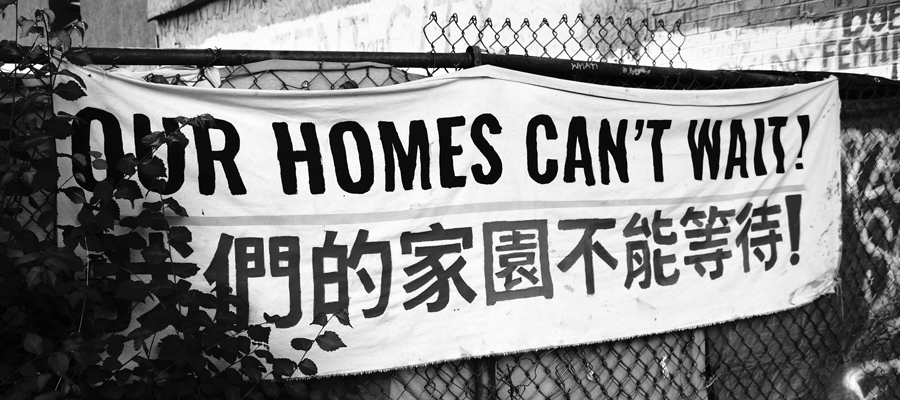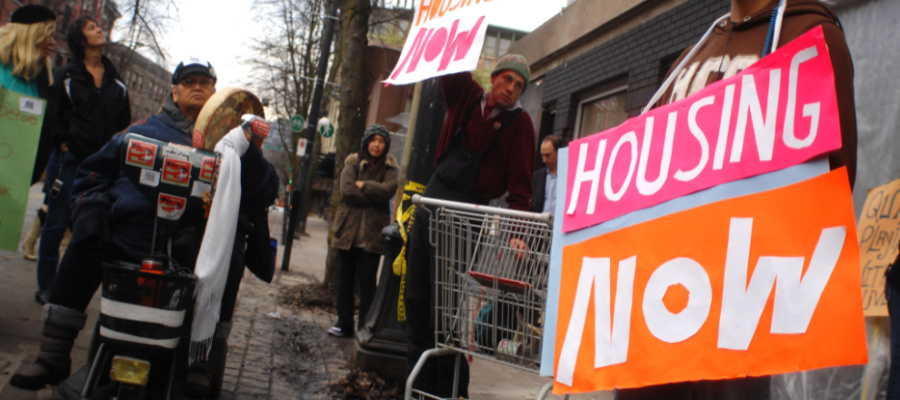Housing crisis worse: Former UN special rapporteur Miloon Kothari revisits Vancouver

As the United Nations’ Special Rapporteur on the Right to Adequate Housing from 2000 to 2008, Miloon Kothari observed the failure of market-based approaches to addressing housing crises.
His 2007 report on Canada called for “a national strategy [for the] large scale building of social housing, and much better tenant protection laws, coordinated strategy on reduction of homelessness, sufficient income, and housing assistance.”
In June, Kothari visited different sites of displacement such as the Balmoral Hotel and the Ten Year Tent City. I interviewed him when he made his initial report in 2007 and again in June on his observations 10 years later. He asserted that “the housing crisis that [I] observed in 2007, 10 years ago, has become worse on virtually every level.”
Kothari also met with members of the Carnegie Community Action Project and heard about the loss of Single Resident Occupancy (SRO) units, particularly in the city’s Downtown Eastside, and the lack of enforcement around standards by the City of Vancouver. Project members explained that the lack of increase in welfare rates for a decade exacerbated the housing crisis even further.
Kothari was very active during his June visit, meeting with the SRO Collaborative and Balmoral Hotel residents prior to the evictions. He also met with representatives of Pivot Legal Society and was briefed on the tent city in Maple Ridge, providing an affidavit to the Supreme Court over the City of Maple Ridge’s injunction against tent city occupants.
Kothari asserted, “The housing crisis that I observed in 2007, 10 years ago, has become worse on virtually every level.”
He also sat down with City of Vancouver officials to discuss what more the City could do in terms of utilizing policy interventions against landlords and implementing a continuum of housing approaches with a human rights lens as a basis for public policy on affordability. He outlined the need for a long-term strategy with real financial investment and greater policy interventions that have teeth, and reiterated the length of time the crisis has been going on. He called for greater urgency from all levels of government to intervene.
At his June 5 public talk, Kothari reflected on Vancouver’s lack of progress and provided an international perspective on the merits and drawbacks of housing solutions that are being implemented globally.
He concluded the conversation emphasizing the importance of civil society in solving the housing crisis:
“I think there’s a duality here which we have to unite. The solutions are there, we have to come up with the solutions, but at the same time we can’t let the government off the hook. They have a reach that none of us individually have, or as institutions. So the question is, how are we proposing the solutions?”
In a city where median incomes have become horrifically decoupled from rental rates and ownership costs, the market will clearly not provide the solution to affordability. Governments need to intervene in this contemporary social crisis with aggressive policies that bring down the costs of housing in order for them to again have a relationship to incomes in the region.
Video of the full talk and subsequent panel discussion is available here.
—
Media coverage of Miloon Kothari’s June 2017 visit:
- CBC News – Vancouver becoming ‘apartheid city’ in housing crisis, says former UN rep
- Radio-Canada – La crise du logement à Vancouver, « c’est l’apartheid », dit un ex-membre de l’ONU
- The Tyee – Vancouver Housing Crisis ‘Worse on Virtually Every Level,’ Says Former UN Investigator
- The Georgia Straight – International expert says Vancouver fails to embrace a rights-based approach to housing
- The Georgia Straight – If Vancouver truly respected human rights, it would allow port-o-potties in tent cities
- Metro News – Vancouver’s housing crisis a form of ‘apartheid:’ former UN housing rapporteur
- The Globe and Mail – As Metro Vancouver’s affordability gap widens, a search for answers
- Metro News – Homelessness isn’t the result of a lack of morals: Mochama
- Roundhouse Radio – Vancouver facing potential “Apartheid” says former UN housing envoy
- The Talon – The Balmoral Hotel: One of the Many Effects of Decades of Neoliberalism in Vancouver
- News1130 – Vancouver becoming an apartheid city: former UN rapporteur
- Carnegie Community Action Project – Former U.N. Rapporteur, Miloon Kothari Speaks Out On Homelessness Crisis In Vancouver – VIDEO
- Vansky – 大温已有“种族隔离”? 前联合国记录员看不下去
- Spacing Vancouver – Housing as a Human Right: Miloon Kothari at the MOV
Topics: Housing & homelessness, Poverty, inequality & welfare


